Promoting SDGs for Islamic Higher Education Libraries in Indonesia
24 أبريل 2024
The United Nations 2030 Agenda for Sustainable Development Goals (SDGs) has yet to be used as a policy basis for developing Islamic religious university libraries in Indonesia. The agenda is an ambitious global commitment to ‘no one left behind’, despite the fact that university libraries do provide access to information resources and contribute to meeting the SDGs.
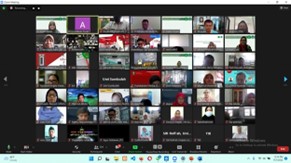
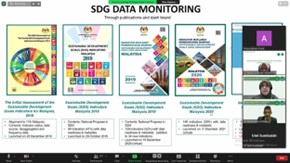
The Library of Maulana Malik Ibrahim Malang (UIN Malang Library) took the initiative to organise an international webinar in collaboration with the Association of Islamic Higher Education Libraries – Asosiasi Perpustakaan Perguruan Tinggi Islam Indonesia (APPTIS) – on 1 Nov 2022. The event was to discuss ‘Empowering Academic Libraries for Sustainable Development Goals (SDGs)’ with the aim to campaign for Islamic religious university libraries and other universities in Indonesia to participate in SDGs-related activities.
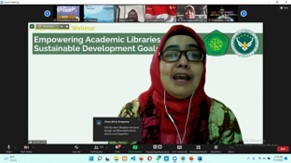 This webinar presents three speakers, namely Dr Nor Edzan Binti Che Nasir (Secretary of IFLA’s Regional Division Committee for Asia Oceania), Dr Labibah Zain (Chairwoman of APPTIS), and Mufid, M.Hum (Head of the UIN Malang Library). 310 participants, including academics, librarians, and teaching staff, attended the event in-person or offline.
This webinar presents three speakers, namely Dr Nor Edzan Binti Che Nasir (Secretary of IFLA’s Regional Division Committee for Asia Oceania), Dr Labibah Zain (Chairwoman of APPTIS), and Mufid, M.Hum (Head of the UIN Malang Library). 310 participants, including academics, librarians, and teaching staff, attended the event in-person or offline.
This webinar was opened by Prof Dr Umi Sumbulah, M.Ag, (Vice-Rector for Academics). She appreciated this webinar and encouraged the UIN Malang library to plan a programme based on the University’s SDGs, namely the development of the 2026 Green Campus. She advised the UIN Malang library to prioritise social inclusion-based transformation.
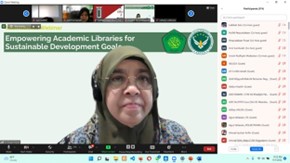 According to Edzan, every stakeholder in the university library needs to understand the SDGs’ concepts, goals, targets, and indicators, which are contextualised in library programmes and services. SDGs-based library development policies and strategies will positively impact the achievement of university and national SDGs targets and indicators. The library’s contribution can start by focusing on objectives 4 (Lifelong Learning), 16 (Access to Information), and 17 (Partnerships). “Today’s libraries must be able to have a positive impact through the quality of education and literacy through excellent service to the community”, she concluded. Meanwhile, as the Chairwoman of APPTIS, Labibah suggested that Islamic religious university libraries implement inclusive libraries as a way for libraries to support achieving SDGs in Indonesia. “Inclusive libraries can optimise the role of libraries in changing people’s lives at large.” Furthermore, as the head of UIN Sunan Kalijaga Library, she gave examples of how the UIN Sunan Kalijaga Library support SDGs through Living Collection and Preserving Culture Programmes.
According to Edzan, every stakeholder in the university library needs to understand the SDGs’ concepts, goals, targets, and indicators, which are contextualised in library programmes and services. SDGs-based library development policies and strategies will positively impact the achievement of university and national SDGs targets and indicators. The library’s contribution can start by focusing on objectives 4 (Lifelong Learning), 16 (Access to Information), and 17 (Partnerships). “Today’s libraries must be able to have a positive impact through the quality of education and literacy through excellent service to the community”, she concluded. Meanwhile, as the Chairwoman of APPTIS, Labibah suggested that Islamic religious university libraries implement inclusive libraries as a way for libraries to support achieving SDGs in Indonesia. “Inclusive libraries can optimise the role of libraries in changing people’s lives at large.” Furthermore, as the head of UIN Sunan Kalijaga Library, she gave examples of how the UIN Sunan Kalijaga Library support SDGs through Living Collection and Preserving Culture Programmes.
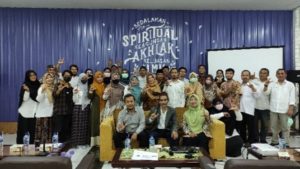
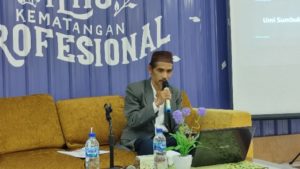
On this occasion, the participants also got an accurate picture of how the university libraries support achieving SDGs. The UIN Malang’s library experience can be used as a best practice for developing religious libraries in Indonesia. According to Mufid, 6 SDGs goals (4, 10, 11, 12, 16, 17) are the focus of the UIN Malang library strategies and policies. The UIN Malang focuses on Goal 4 (Lifelong Learning), including information literacy instructions, and training on Research tools (Reference manager tools, Grammarly tools, plagiarism checkers). There are 100 sessions in a year. In support of Goal 10 (Reduce Inequality), the library provides welcoming spaces, lifts for persons with disabilities, and improving Arabic collection retrieval by creating metadata for the Arabic catalogue. In support of Goal 11 (Preserving Cultural Heritage), the library digitises the theses and preservation of highly demanded collections. In support of Goal 12 (Reduce and Reuse), the library accepts thesis collection in electronic format only and provides book borrowing through Malang Interlibrary Loan (MILL). In support of Goal 16 (Access to Information), the library provides access to scientific information subscribes and open access to the type of books and journals in printed and electronic formats. Last but not least, in support of Goal 17 (Partnerships), the library conducts various national and international partnerships. International activities include Consortium for journal database Procurement, Partnership with publishers in exhibition activities, Internships for university students, Member of Malang Interlibrary Loan, and Member of IFLA and IATUL.
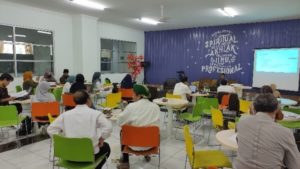
This webinar activity is expected to drive all university libraries in Indonesia, mainly Islamic religious libraries, to focus on optimising the achievement of SDGs. Providing access to inclusive information resources and facilities will give equal rights to the people served to obtain a quality education. Quality education is highly correlated with welfare. This strategy is a concrete contribution of libraries to support the global commitment of “no one left behind” in 2030.
Contributed by Labibah Zain, Chairwoman, Association of Islamic Higher Education Libraries and Member, IFLA Regional Division Committee for Asia and Oceania